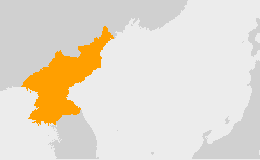Korea (Democratic People’s Republic of)

Like every year since 2005, the U.N. General Assembly issued a resolution condemning the gross violations of human rights in North Korea. In March, North Korea allegedly sunk a South Korean warship and in November a South Korean island close to the border was bombarded by North Korean artillery, causing serious tensions between the countries. At the same time the North Korean people faced devastating food shortages at home, and the situation looks to get even grimmer in 2011. During the year, the ailing Kim Jong-Il’s son, Kim Jong-Un, was also officially appointed heir to the leadership of the country.
Legal
Freedom of association / Right to organise
Freedom of association
The right to freedom of association is recognised by law but strictly regulated.
Anti-Union discrimination
The law does not specifically protect workers from anti-union discrimination.
Categories of workers prohibited or limited from forming or joining a union, or from holding a union office
- Others categories
- A special law was passed for the Kaesong Industrial Complex, which opened in June 2004.There are no provisions in the law that guarantee freedom of association or the right to collective bargaining, and there is no protection in the law for workers who raise complaints.
Right to collective bargaining
Right to collective bargaining
The right to collective bargaining is not protected in law.
Right to strike
Right to strike
The right to strike is prohibited.
In practice
The government controls all aspects of employer-worker relations, including assigning all jobs and determining the wages. Hence there is no right to bargain collectively. Joint ventures and foreign-owned companies have to hire their employees from lists of workers vetted for their “ideological purity” and drawn up by the ruling party.
Independent trade unions are prohibited, and the only authorised trade union organisation, the General Federation of Trade Unions of Korea, is controlled by the ruling party, the Korean Workers’ Party. It operates according to the old “Stalinist” model of trade unions, with responsibility for mobilising workers to meet production targets and providing health, education, culture and welfare services.
Approximately 40,000 North Korean workers are making clothes, shoes, watches and other light goods in this zone, which has about 115 factories. The North Korean government selects worker representatives in Zone workplaces, subject to the approval of the South Korean company management.
Recruitment of workers to work in the Zone is controlled by the North Korean government. While article 32 of the KIC Labour Law states that workers should be paid directly in cash, in practice this does not happen. Since the Zone was opened, the North Korean government has demanded that all salaries be paid to the government, and Zone employers have acceded to this requirement. After making deductions for a government-controlled fund, the North Korean government pays the workers their salary. The continued use of this indirect payment system violates an agreement on the operation of the Zone made between the governments of North Korea and South Korea.
